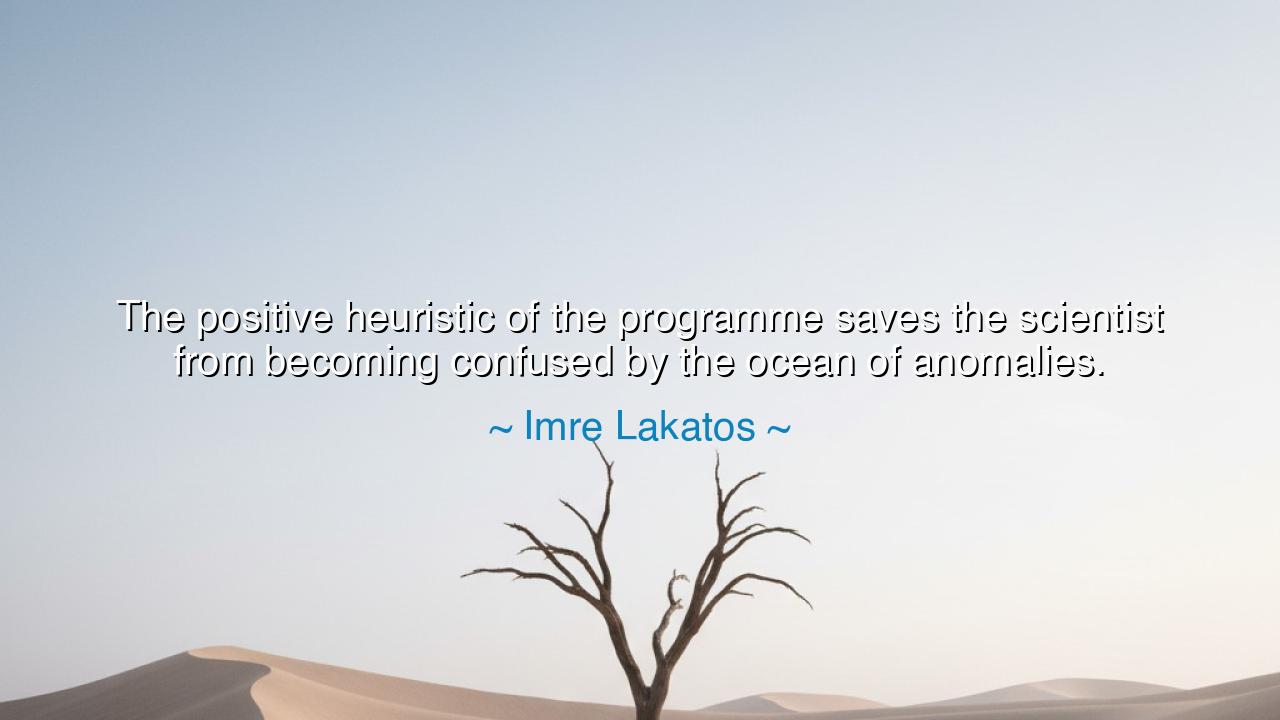
The positive heuristic of the programme saves the scientist from
The positive heuristic of the programme saves the scientist from becoming confused by the ocean of anomalies.






The words of Imre Lakatos — “The positive heuristic of the programme saves the scientist from becoming confused by the ocean of anomalies.” — are like a compass set against the storms of uncertainty. They speak of the fragile path of knowledge, where the seeker must not be drowned by contradictions and puzzles, but guided by principles that show the way forward. Without such a heuristic, the scholar is like a sailor lost at sea, tossed upon waves without star or rudder.
To name it positive is to remind us that it does not destroy or deny anomalies, but gives direction amid them. For in the pursuit of truth, the world will always present countless anomalies — data that does not fit, mysteries that resist explanation, shadows that confuse the mind. The programme does not silence these voices, but orders them, allowing the scientist to continue building rather than collapsing in despair. It is a shield against chaos, a map through the wilderness of doubt.
The ancients knew this principle in their own way. When Ptolemy charted the heavens, he faced anomalies that seemed to mock his spheres and circles. Yet his system endured for centuries, because its heuristic gave coherence and guidance, even if imperfect. Later, when Copernicus and Kepler overturned the old cosmos, they too leaned on guiding principles that allowed them to see beyond confusion. Thus Lakatos speaks not of error or perfection, but of survival in the storm of discovery.
The phrase ocean of anomalies is no mere metaphor; it captures the very nature of reality as experienced by those who probe its depths. Truth is not handed whole, but piecemeal, wrapped in contradictions. To face this ocean without guidance is to drown; to face it with a positive heuristic is to sail toward new horizons. The greatness of the scientist lies not in avoiding anomalies, but in enduring them, guided by faith in a path worth pursuing.
Let the generations remember: the quest for knowledge is never clear, and doubt will always outnumber certainty. But if you cling to a guiding programme, if you trust the positive heuristic that points you toward fruitful questions rather than endless confusion, you will endure. Lakatos teaches that wisdom is not the absence of anomalies, but the courage to face them without losing direction. In this, the scientist becomes like the ancient voyager, who, though surrounded by endless sea, still sails by the star.






TTu
This quote seems to imply that the heuristic helps prevent overwhelming confusion, but I also see it as a potential risk. Could it encourage scientists to be overly reliant on existing frameworks, rather than being open to truly transformative, paradigm-shifting ideas? How do we balance sticking to a heuristic with allowing room for revolutionary thought?
TPThuy Phuong
Lakatos' idea about the 'positive heuristic' speaks to the importance of having a structured approach to research, but I wonder—how often do these heuristics lead to tunnel vision? How do scientists know when to push beyond the heuristic and question the anomalies that don’t fit into their existing models?
TLNguyen Tan Luc
I find this quote both fascinating and cautionary. While heuristics are helpful in guiding scientific research, they also seem to create a framework that may disregard anomalies. Is it possible for a positive heuristic to be flexible enough to adapt to new information without disregarding contradictory data? Or does it inherently limit innovation?
NMNgoc Mai
It’s interesting how Lakatos suggests that a heuristic can guide scientists through complex data. But does this approach risk narrowing a scientist’s perspective, potentially preventing them from seeing new paradigms? Can a heuristic become a crutch that limits the scope of discovery, rather than aiding it?
UNuyen nhi
This quote makes me think about the way scientific theories are often structured to minimize confusion in the face of contradictory data. But, could this 'positive heuristic' potentially lead scientists to ignore or dismiss important anomalies in their research? How do we ensure that such heuristics don’t blind us to significant findings that could challenge existing theories?